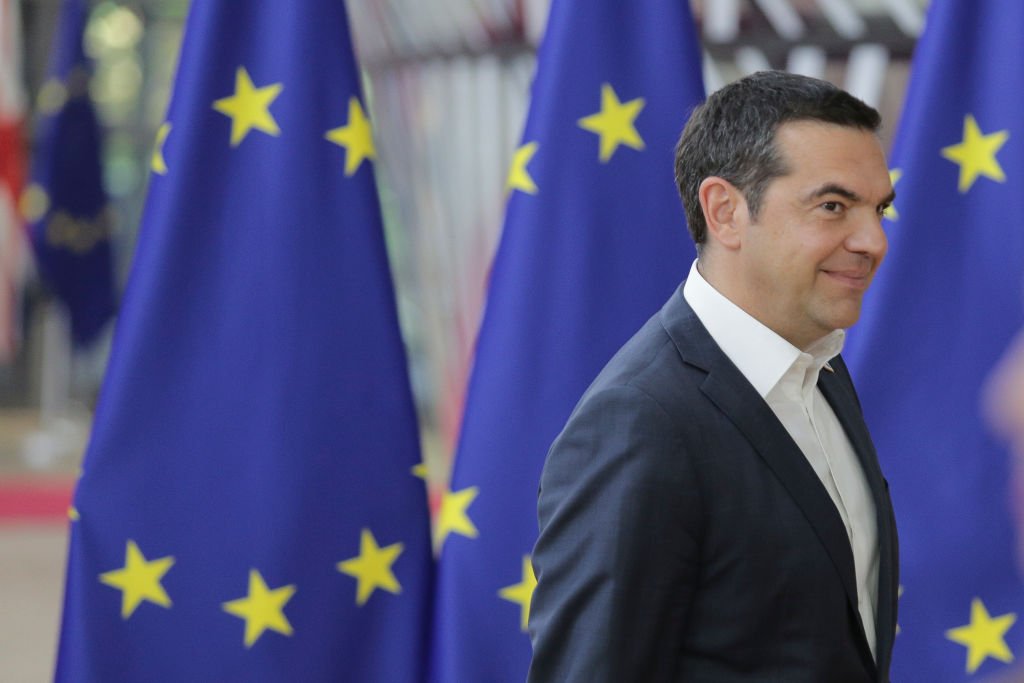ATHENS – The prospect of former Prime Minister Alexis Tsipras returning to Greek politics in a leading role has been gaining traction in recent weeks. But while the country’s fragile political environment may provide an opening for the leftist politician, he shouldn’t expect a red-carpet welcome.
Tsipras governed the Mediterranean country during the turbulent period of 2015–2019, when Greece stood on the brink of economic collapse. In July 2015, he organised a controversial referendum in which 61% of Greeks rejected an EU proposal for further austerity measures.
However, Tsipras ultimately agreed to a third bailout worth €86 billion, arguing that it was necessary to prevent Greece’s collapse.
Once seen as a troublemaker in Brussels, Tsipras eventually emerged as a reformist. During his term, Greece officially exited its bailout programs after nearly a decade of financial assistance. Nevertheless, austerity and economic hardship led to his defeat in the 2019 elections.
He subsequently lost all elections to the conservative New Democracy party and ultimately resigned as leader of the leftist Syriza party in June 2023.
Since then, the leftist opposition has remained fragmented, divided into small parties unable to challenge the country’s conservative leadership. Syriza has shrunk in the polls to around 5%. Moreover, no opposition politician has managed to gain enough popularity to unite the progressive political forces against Prime Minister Kyriakos Mitsotakis.
As for Tsipras, he has largely stayed on the sidelines, rarely making public statements about the country’s political future.
But in recent weeks, his name has resurfaced after he stated in an interview with Le Monde that he missed “active politics and contact with voters”.
The comment fueled speculation that Tsipras is planning a political comeback, potentially by launching a new party.
Speaking to Euractiv, people close to Tsipras denied such plans. They stated that the “only planning for the time being” involves the publication of Tsipras’ book by the end of the year, as well as his scheduled speech in early September at the Thessaloniki International Fair – an influential annual forum where political parties present their policy priorities for the coming year.
The chances
Despite these denials, local press reports insist that Tsipras’ return – possibly through a new party – is only a matter of time. Analysts argue that Mitsotakis’ steadily declining popularity, combined with the absence of a credible opposition figure, provides fertile ground for Tsipras’ comeback.
New Democracy is falling in the polls, while rumours circulate that former hardliner PM Antonis Samaras is planning to form a new conservative party – posing a threat to Mitsotakis on his right flank.
And on the foreign policy front, Greece is facing significant challenges with its neighbours.
“Turkey is striking deals with Libya over maritime zones, questioning Greece’s sovereignty,” a leftist pro-Tsipras politician, speaking on condition of anonymity, told Euractiv. “Meanwhile, there is an ongoing diplomatic spat with our ally Egypt over the Saint Catherine Monastery. Mitsotakis is under pressure from all sides, but no solutions are in sight.”
Another concern for Mitsotakis is an “uncontrolled factor” – EU Chief Prosecutor Laura Kövesi, according to another leftist politician. Kövesi exposed a scandal involving the misuse of EU agricultural funds and has heavily criticised Mitsotakis for obstructing her investigation into a train accident that killed 57 young people, where EU funds were also mismanaged.
Press reports in Athens suggest that further investigations into misuse of EU funds are on the way.
The challenges
Tsipras’ main challenge will be convincing the electorate why he deserves a second chance. The anti-Tsipras sentiment in society – and a significant portion of the mainstream media – remains strong, with many believing that Tsipras risked the country’s future in the EU. Others still feel betrayed by his decision to disregard the referendum result and submit to EU financial pressure.
Some members of the New Democracy government reportedly welcome the prospect of his return, seeing it as a way to activate anti-Tsipras reflexes among voters.
Tsipras will have to explain how things would be different this time, and perhaps more importantly, whom he will choose to surround himself with. Previous choices, such as former Finance Minister Yanis Varoufakis, cost him dearly.
The global political climate is also far from favorable. During his first term (2015–2019), Tsipras had few allies and faced a Europe dominated by the right. Today, the situation is arguably worse. Right-wing parties still dominate, many now influenced or even supported by a resurgent far right.
But according to MEP Nikolas Farantouris (The Left), this could present an opportunity. He told Euractiv that Tsipras enjoys support from Europe’s progressive forces. Although officially part of Europe’s left, Tsipras participated as an observer in the more centrist EU Socialist summits.
“The problem of fragmentation among progressive forces isn’t unique to Greece – it’s an issue across Europe, and it only strengthens the far right,” Farantouris said. “Hasn’t the time finally come for reconstruction and mobilisation?”
(vc)





